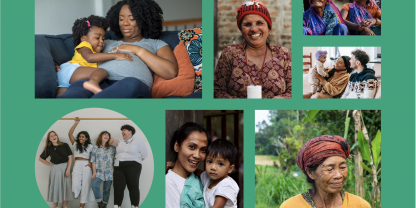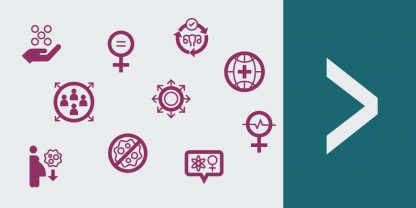Biennial Report 2021–2023: the President's report
As the 2021 World Congress ended, I shared with the FIGO membership our vision for a 10-year strategic plan for care across the lifespan: from adolescence through maturity. It focused on our belief that FIGO is uniquely situated to bring leaders together to improve the health and wellbeing of women around the globe. With a foundation based on our strengths of research interpretation and implementation, education, advocacy and health systems strengthening through capacity building, we can collaborate with member societies, regional federations and likeminded organisations. Through a united voice we amplify our messages.
FIGO set out to grow our relationships with the World Health Organization (WHO), United Nations Family Planning Association (UNFPA), Partnership for Maternal Newborn Child Health (PMNCH), USAID, Planned Parenthood, International Confederation of Midwives (ICM) and International Pediatric Association (IPA), among many others.
In this biennial report you will find the incredible work of our experts: three divisions, 17 committees and hundreds of dedicated OBGYNs who have led the work. You will see the depth and breadth of FIGO HQ staff and the projects that they have led around the world. You will also see the important role of communication – whether that is through the International Journal of Obstetrics and Gynecology (IJGO), our FIGO webinars, our Statements, or our newsletter. FIGO is delivering a robust platform through which to communicate, educate, share and amplify.
Finally, in this report, you will get a sense of my personal interests and dedication. I believe that when we invest in women we invest in the health of this and future generations. This investment takes the form of well woman health care – with the knowledge that optimising a woman’s health and allowing a woman to decide if and when to conceive are the most effective means of empowerment. This investment requires an understanding that many forms of environmental perturbations – from climate change to environmental toxics – impact the quality of life on earth, and threaten us, our families, our communities and our planet earth in ways we did not imagine even a generation ago. And this investment requires systematic change based on knowledge, education and leadership. FIGO provides that leadership.
The following summarises many of our activities, although in many cases the activities themselves will have further elaboration under the Committee Reports. I have two years of what I termed “The Week in Review” that summarised every aspect of FIGO work. I have now organised these weeks into themes.
I extend my thanks to the member societies of FIGO for asking me to serve these two years. I have had the good fortune to provide more than 50 lectures during these two years. But more importantly I was able to represent the good will of FIGO and the need to improve the health and wellbeing of women around the world. After all, FIGO is the Global Voice for Women’s Health.
– Dr Jeanne Conry, FIGO President 2021–2030
Partnership for Maternal, Newborn & Child Health
FIGO is a member of the Health-Care Professional Associations (HCPA) within PMNCH. We had an opportunity to nominate physicians to committees and working groups and were fortunate to have several of our leaders selected. They have dedicated much time and energy bringing forth a woman’s health perspective – again with the theme of adolescence through maturity. FIGO was fortunate to have these leaders: Jaideep Malhotra, Atziri Ramirez Nigrin, Chipo Gwanzura, Goknur Topcu, Ivonne Diaz, Goknur Topcu, Bo Jacobsson, MaryAnn Lumsden, Gamal Serour, Marlene Temmerman and Jeannie Conry – plus our own Mark Hanson, a virtual OBGYN.
I spoke at PMNCH on behalf of our FIGO foundation pillars and said that we support the recommendations of knowledge and evidence, particularly maternal mortality, stillbirth, preterm delivery, violence against women, planetary health and women's health, and the need for sexual and reproductive health access. I stressed that we are the leaders in global OBGYN and affirmed the need for collaboration with all health care practitioners.
Infectious diseases
We have participated in Hepatitis B and C recognition for diagnosis and treatment, particularly given the opportunities during pregnancy. FIGO has aligned with the Coalition for Global Hepatitis Elimination. FIGO hosted a workshop on immunisations that brought in global leaders to address strategies to improved uptake of vaccinations: from COVID and tdap to HPV and RSV. It is the strategy based on knowledge, education and effective communication. FIGO collaborated to create a speaker’s academy – an opportunity that led from our successful immunisation workshop. And we have been a strong global advocate for HPV vaccination, with messaging around early vaccines and the strategies to accomplish this.
Reproductive rights
FIGO developed important policy and statements around access to abortion, based on the fact that reproductive rights are basic human rights. My fundamental message for two years has been that FIGO needs to strengthen global resolve: that FIGO speaks based on science; we remove the politics, religion, bias, control, and misogyny. As an organization, FIGO speaks on behalf of saving women’s lives. Based on the work by FIGO HQ staff and our committees, we have written amicus curiae briefs and statements for country support, we have led webinars, given lectures, joined in communications and supported our member societies. Early in our FIGO journey we received a letter from Slovakia after FIGO wrote a statement of support regarding access to abortion. We heard there was a tight but successful vote. Their feedback to FIGO: “We and our partners in Slovakia are all very happy and very grateful to FIGO for the extremely important support in defeating these harmful proposals.”
Ipas and the FIGO’s Advocating for Safe Abortion Project offered values clarification training, which was an invaluable step for us all. FIGO has celebrated with member societies that have strengthened rights – like Japan providing access to misoprostol. And our colleagues in Latin America shared the Panama Declaration signed by all 19 Presidents of FLASOG addressing women’s access to reproductive health. In November 2022, FIGO codified this work with the Cartagena Declaration – again reiterating that it is the woman who chooses her reproductive needs.
Climate change
We began our 2021–2023 term with COP26. FIGO released our IJGO article just in time for the conference and have been urging leaders in OBGYN to address this need. IJGO released an entire issue devoted to the climate crisis. AOFOG as a Regional Federation has developed their own task force and created an educational curriculum. I had the good fortune to provide lectures on climate change in all five of our regions. Our committee is active, and we are partnering with the WHO to expand health care involvement on this critical topic.
Safe and Respectful Care
FIGO placed safe and respectful care at the centre of our strategic plan, both in our core values and how we communicate with respect to one another and in patient care. FIGO met with the White Ribbon Alliance to address concerns about how often a lack of respect or even dignity is shown to women, particularly when in labor – regardless of community or conditions. FIGO created a lecture to be shared with member societies based on safe and respectful care. PMNCH spent much time discussing the White Ribbon Alliance concerns and generated a thoughtful and forward-looking commentary on the needs essential to respectful care.
Education Communication and Advocacy Committee (ECAC)
This Committee began as a Consortium in 2018 but morphed into a different structure with the advent of regional trustees. What was previously a structure to communicate more effectively with oversight of webinars, statements and topics for IJGO became a more robust look at the five FIGO regions as a means of furthering initiatives that need to take hold. FIGO benefits from North–South and South–South learning and collaboration, and this is most successful through our regional trustees.
Leadership
FIGO has the strength of our global societies, and we can provide for them both expertise and training. Regardless of the location, I have led webinars or given lectures on leadership. We used a leadership approach as we proposed a grant to address maternal health outcomes in six countries: Ethiopia, Kenya, Nigeria, Bangladesh, India and Pakistan. The goal of course is to improve maternal and newborn health outcomes; through a focus on leaders overcoming barriers to care and on developing systems that effect change.
Communication
This is always a struggle in a large organisation, but the aftereffects of COVID made all of us more comfortable with online meetings. We started monthly Board of Trustee meetings, quarterly FIGO Council meetings, quarterly Division and Committee Chair meetings and Quarterly Presidents meetings as an open invitation to FIGO member societies.
World Health Organization
FIGO is a non-state actor in official relations with the WHO, and we develop and abide by commitments with the WHO regarding guideline development and disbursement. We nominate our FIGO leaders to represent us on important committees and guideline development groups. It is a respectful and collaborative partnership, and FIGO recognises that our communication with WHO is critical. Going forwards, as WHO places an expectation of a minimum number of visits for prenatal care, FIGO must be a voice for the content of such visits. Examples to consider: haemoglobin, blood type and Rh, STD at visit one. Content and timing need to be emphasised.
World Health Assembly
In recent years – and until May 2023 – the World Health Assembly has been a virtual event, so our biggest opportunity was preparing statements to deliver at a specified time and duration. In May 2023 we took advantage of the in-person networking, meetings and educational forum. We still were faced with a one-minute time limit to present, but it made the opportunity for networking more real.
World Association of Trainees in Obstetrics & Gynecology (WATOG)
FIGO committed to WATOG to look at opportunities for collaboration and support. FIGO nominates WATOG members for active roles and we have been rewarded with their active participation. Each committee contains a representative from WATOG, and they also serve on World Congress committees. In 2023, WATOG planned the One World Exchange in cities in France that brought 50 trainees to the FIGO World Congress from all five FIGO regions. The exchange was so successful, we hope to replicate it at every future World Congress.
The Red Line Initiative
I was honoured to be received and present to the French Academie of Medicine – an august body in place since a decree by King Louis XVlll in 1820. They hosted Dr Denis Mukwege and proposed a partnering with FIGO to bring awareness to OBGYNs about the global concern of women as weapons in war. FIGO went on to create statements, webinars, lectures – and our keynote address at the 2023 World Congress was Dr Mukwege. We have shared editorials in IJGO and asked for our Member Societies to sign on. During this time, Ukraine was invaded by Russia, and FIGO engaged in weekly meetings to offer support financially and with logistics through WHO–USAID meetings.
FIGO and the Mukwege Foundation propose the creation of an international instrument that draws a red line against the use of sexual violence as a method of warfare and establishes a clear framework for strong and timely action. This initiative will be the first international convention that addresses sexual violence as a method of war. The convention will clarify and reinforce existing international obligations of states under customary international law, international human rights law, international humanitarian law, and international criminal law. FIGO has been asked to partner with and lead OBGYNs from around the world as the messenger for a global revolt against the use of women as weapons of war.
Well woman health
While serving as FIGO President, I also chaired the USA Women’s Preventive Services Initiative (WPSI). Although based in the USA, all of the information, infographics, tables and research is available to any and all, online and via an app. I was able to share this work with our FIGO Committees. The collaboration ultimately led to FIGO and our summary and infographics of a Well Woman Wellness Wheel. This committee focuses on prevention and thus integrates itself with every other committee. As such it fits better into the centre sphere of FIGO’s structure – still independent but recognising that it integrates with Sexual and Reproductive Health and Wellbeing, with Women’s Cancer, with Menstrual Disorders and Related Health Disorders, and with Benign Surgery.
Environment and reproductive health
FIGO saw several committees collaborate on shared messaging and webinars. FIGO began collaboration with the Prepregnancy 2 Infancy (P2i) initiative, with a goal of reducing exposure to environmental toxics and improving women and newborn health. Our committee has continued to research and educate, and I was able to provide lectures around the world on this topic. FIGO is participating in the BJOG issue devoted to the environment and is very proud that our own IJGO has led climate change and environmental topics.
Rotary International
FIGO has many Rotarians, and we have hosted meetings to look at opportunities for collaboration. Rotary International, like FIGO, has societies around the globe, focused on leadership development. They have expressed an interest in women’s health issues, so this is an untapped opportunity for FIGO collaborative efforts. I was able to provide a welcome address at their annual meeting. Dr Eliana Amaral and Professor Mary Ann Lumsden led two sessions and I recorded a brief presentation suggesting how we can collaborate on HPV vaccination and leading efforts in maternal mortality. Rotary has a woman President for the first time in their history, and she has brought women’s health to the forefront.
Governance and policy
The FIGO Board of Trustees determined that several internal policies were due for review and set about updating these. The agreement among Trustees was that all documents would be completed and reviewed by the Spring of 2023 to allow publication and implementation.
Maternal mortality
FIGO focused on maternal mortality through our projects, grants, committees, webinars, statements and publications. From meetings with WHO and ICM on heat stable carbetocin, participation in the Dubai PPH Summit, AlignMNH, the Zero Maternal Deaths work in Latin America, the IJGO issues devoted to PPH and Childbirth, and of course our participation in IMNHC. FIGO brought leaders to each of these events, spoke strongly on behalf of collaboration, and focused on health systems strengthening and collaborative practice with respectful care.
FIGO has led statement development about anemia and the role of uterotonics and systematic approaches to PPH. Our grant from 2023 to 2025 from the Bill and Melinda Gates Foundation is meant to reduce maternal morbidity and mortality, improve newborn health and use leadership techniques to effect change. Reducing maternal mortality is one of our ten commitments in our Strategic Plan. In FIGO’s grant we have stated strongly that there are three intertwined components: Leadership–Barriers Analysis–Effective Coverage. If we solve this, we will see success.
Global Surgery Alliance
FIGO met with leaders from this alliance and introduced them to our Benign Surgery Division Leader. At the World Health Assembly there were many examples about the need for comprehensive integrated surgical care, but many of the examples were from obstetrics and gynecology – without FIGO having an extensive role. Our FIGO Fistula Surgery Training Initiative has been a part of the alliance. I shared the mantra of the right surgeon, with the right procedure in the right place.
Navigate through the rest of the Biennial Report using the links below.


